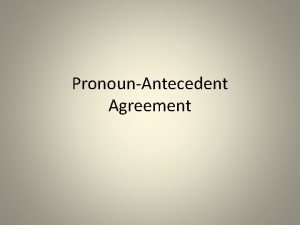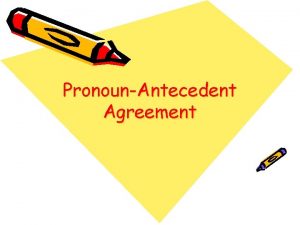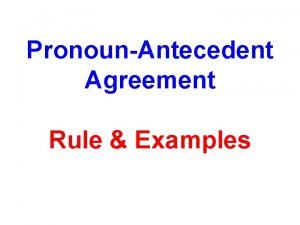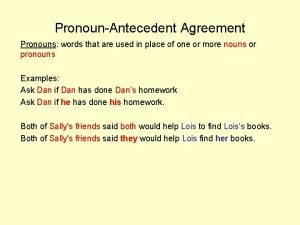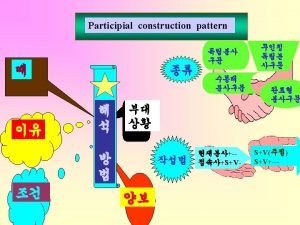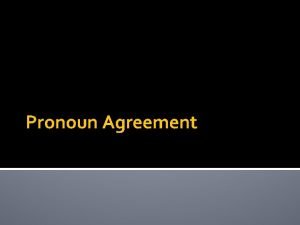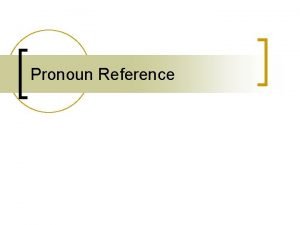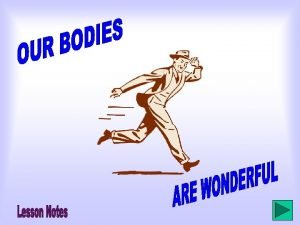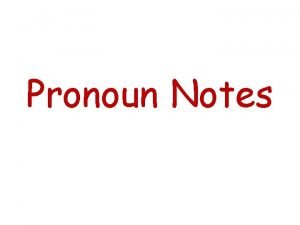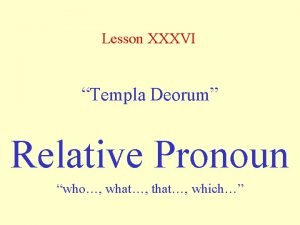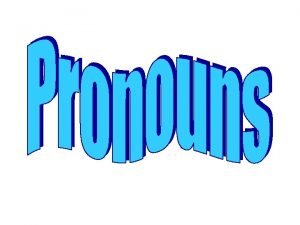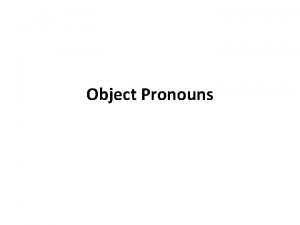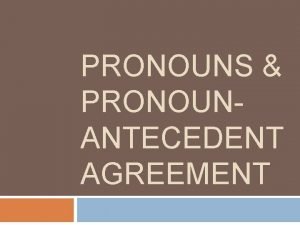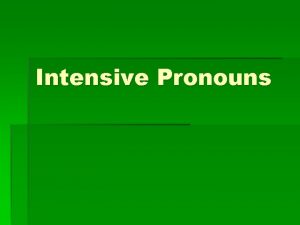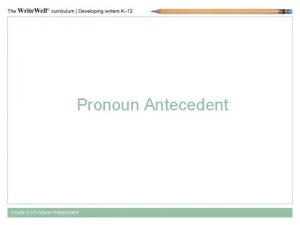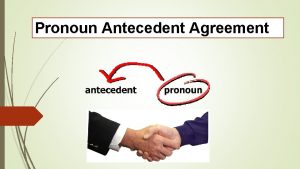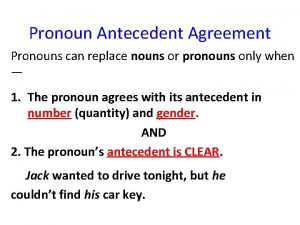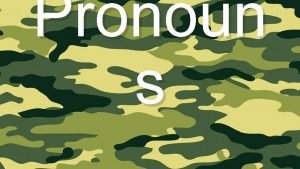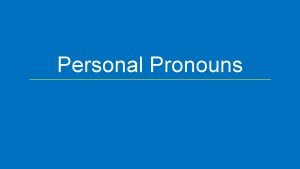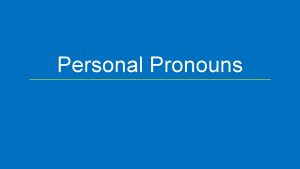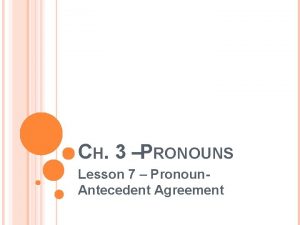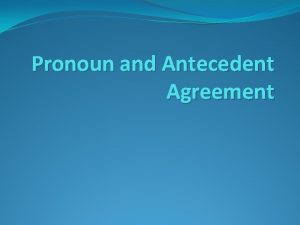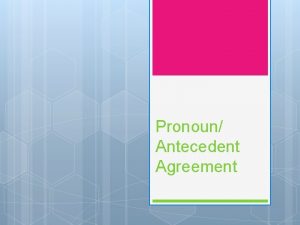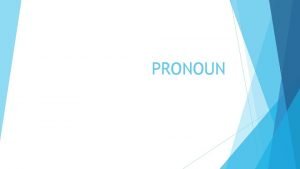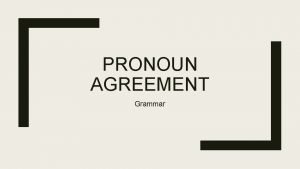Pronoun Antecedent Agreement Can you identify pronouns 1



















- Slides: 19

Pronoun – Antecedent Agreement

Can you identify pronouns? 1. Marcy had obviously forgotten when her report was due. (1) 2. I wore the weirdest vampire costume to the Halloween party. (1) 3. "It is really none of my business, " he mumbled. (3) 4. She likes their fruit salad best. (2) 5. It was supposed to rain again; the weather has been dreary lately. (1) 6. Kenneth turned the corner recklessly in his new car and scratched it. (2) 7. The squirrel balanced itself on the tree branch high above me. (2) 8. Riley took his book and placed it on the table next to him. (3) 9. He applied for a credit card online today and they approved him. (3) 10. Liza had to buy herself a new pair of glasses because her sister accidentally sat on them and broke them. (4) The number of pronouns are indicated at the end of the sentence.

What is an ANTECEDENT? An antecedent is a word in a sentence that a pronoun is referring to. When you use a pronoun, you must be sure it agrees with its antecedent. v. Rosa said she lost her glasses. This is the word that the pronouns are referring to. So Rosa is the antecedent. These are the pronouns.

v. Hank took his journal with him. This is the word that the pronouns are referring to. So Hank is the antecedent. These are the pronouns.

• What is the pronoun and its antecedent in this sentence? v This chalkboard looks clean because I washed it yesterday.

Make a T chart Label it Pronoun/Antecedent 1. The ball flew by Mr. Potter and just missed him. 2. Rachel, please show me your painting. 3. The sea horse wrapped its tail around a piece of seaweed. 4. Kara tapped on the door, but nobody heard her. 5. Whales can’t breathe underwater, so they must come to the surface for air.

Ticket Out the Door 1. What is a pronoun? 2. What is an antecedent? 3. What is the pronoun in this sentence? Mother called to the twins and told them dinner was on the table. 4. What is the antecedent in the sentence?

• A pronoun should agree in gender with its antecedent. If the antecedent is … Female She Hers Male He Him His Neutral It Its

• A pronoun should agree with its antecedent in number. • A pronoun that refers to a SINGULAR antecedent is singular in Singular Antecedent number. v. Please put the lawn mower away after you have finished using it. Singular Pronoun

v. A pronoun that refers to a PLURAL antecedent is plural in number. Plural antecedent v These tools will last longer if you take care of them. Plural Pronoun

Indefinite Pronouns • Some pronouns are indefinite…which means they could be singular or plural! • The prefix –in means “not”. • So INdefinite pronouns are NOT DEFINITE in number.

You should use the following indefinite pronouns as SINGULAR Anybody Anyone Anything Each Either Everybody Everyone Everything Neither Nobody No one Nothing One Somebody Someone Something

Examples – Singular Indefinite Singular Both Singular – They Agree! Singular Possessive v Has one of the hamsters hurt its leg? v. Someone left his or her jacket on the Do not use THEIR! bus. Singular (it’s PLURAL!) Singular If you don’t know whether the antecedent Singular is a boy or a girl, use his or her! v. Everyone on the girls’ team has her Do not use THEIR! own jacket. I can use her because I know it’s a GIRL! (it’s PLURAL!)

You should use the following indefinite pronouns as PLURAL Both Few Many Several

Examples – Plural Indefinite Plural They are both PLURAL so they AGREE with each other! Plural v. Both of the birds had hidden their nests well. Plural v. Several of the spiders continue to live under that log; it is where they Plural hatched. Plural v. On a night like this, few of the travelers will reach their destinations on schedule. Plural

These pronouns may be SINGULAR or PLURAL depending on how they are used in the sentence. All Any More Most None Some

Examples – Singular or Plural Indefinite Pronouns • None of the cereal has lost its crunch. (None is singular because it refers to the singular noun cereal) • None of the cereal flakes have lost their crunch. (None is plural because it refers to the plural noun flakes)

Use a singular pronoun to refer to two or more singular antecedents joined by or or nor. Singular Either Miguel or Randall has his painting on display. Singular Neither Kari nor Marta will lend you her book.

Use a plural pronoun to refer to two or more antecedents joined by and Plural When Tyrell and Davis get home, they will be surprised. Plural Have Chelsea and Susan tried on their new outfits?
 Pronoun and antecedent
Pronoun and antecedent Pronoun definition
Pronoun definition Antecedent pronoun agreement
Antecedent pronoun agreement Antecedent examples
Antecedent examples Antecedent pronoun
Antecedent pronoun Who which whose
Who which whose What is the basic principle of pronoun antecedent agreement
What is the basic principle of pronoun antecedent agreement Pronoun and antecedent
Pronoun and antecedent Whats a pronoun antecedent
Whats a pronoun antecedent Pronoun-antecedent
Pronoun-antecedent What is the basic principle of pronoun antecedent agreement
What is the basic principle of pronoun antecedent agreement Personal and object pronouns
Personal and object pronouns If you think you can you can poem
If you think you can you can poem Pronouns and their antecedents must agree in
Pronouns and their antecedents must agree in Notes on pronouns
Notes on pronouns Relative clause latin
Relative clause latin Pronoun jeopardy
Pronoun jeopardy Singular object pronouns
Singular object pronouns Is you a pronoun
Is you a pronoun What is an intensive pronoun
What is an intensive pronoun

